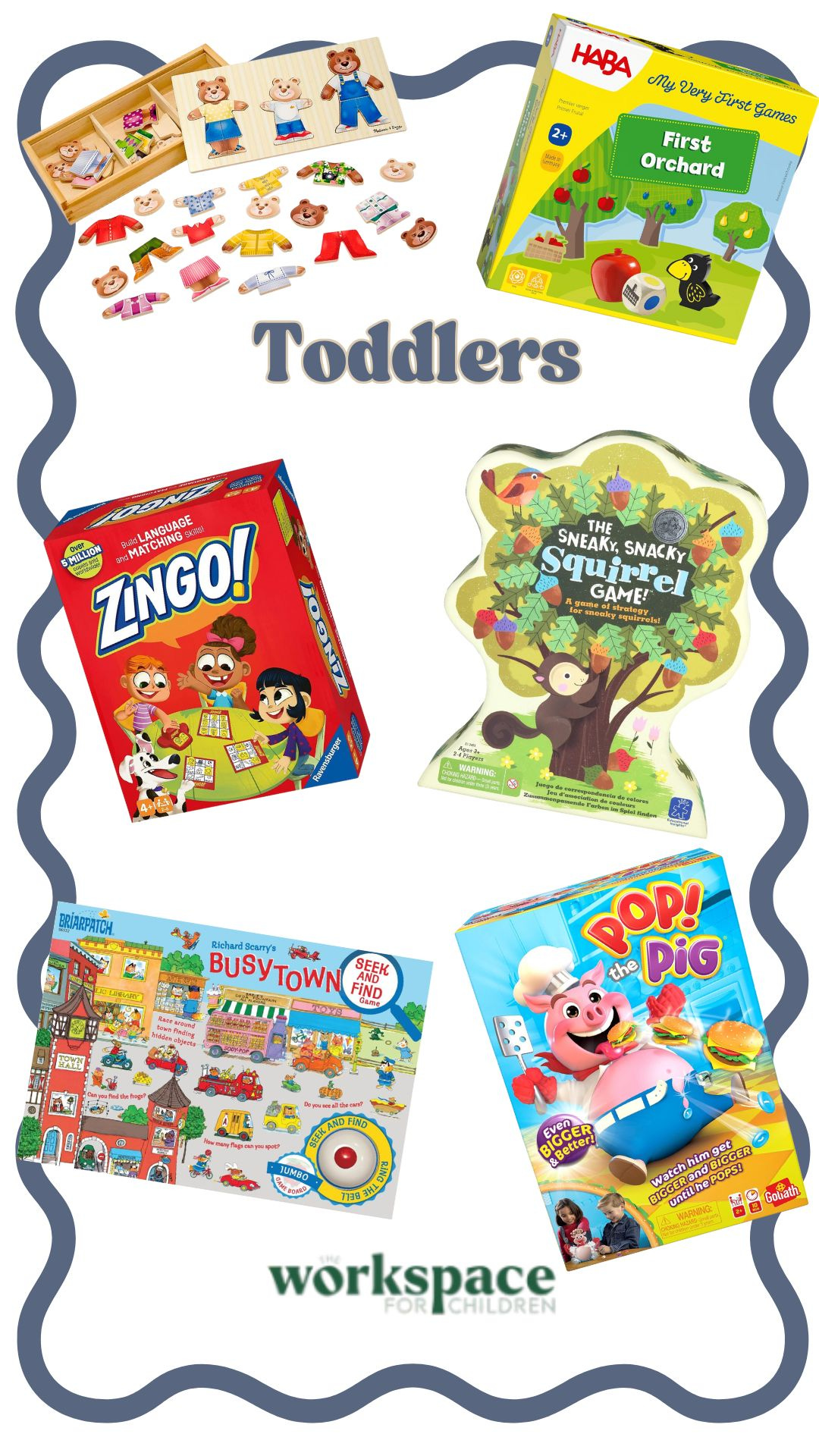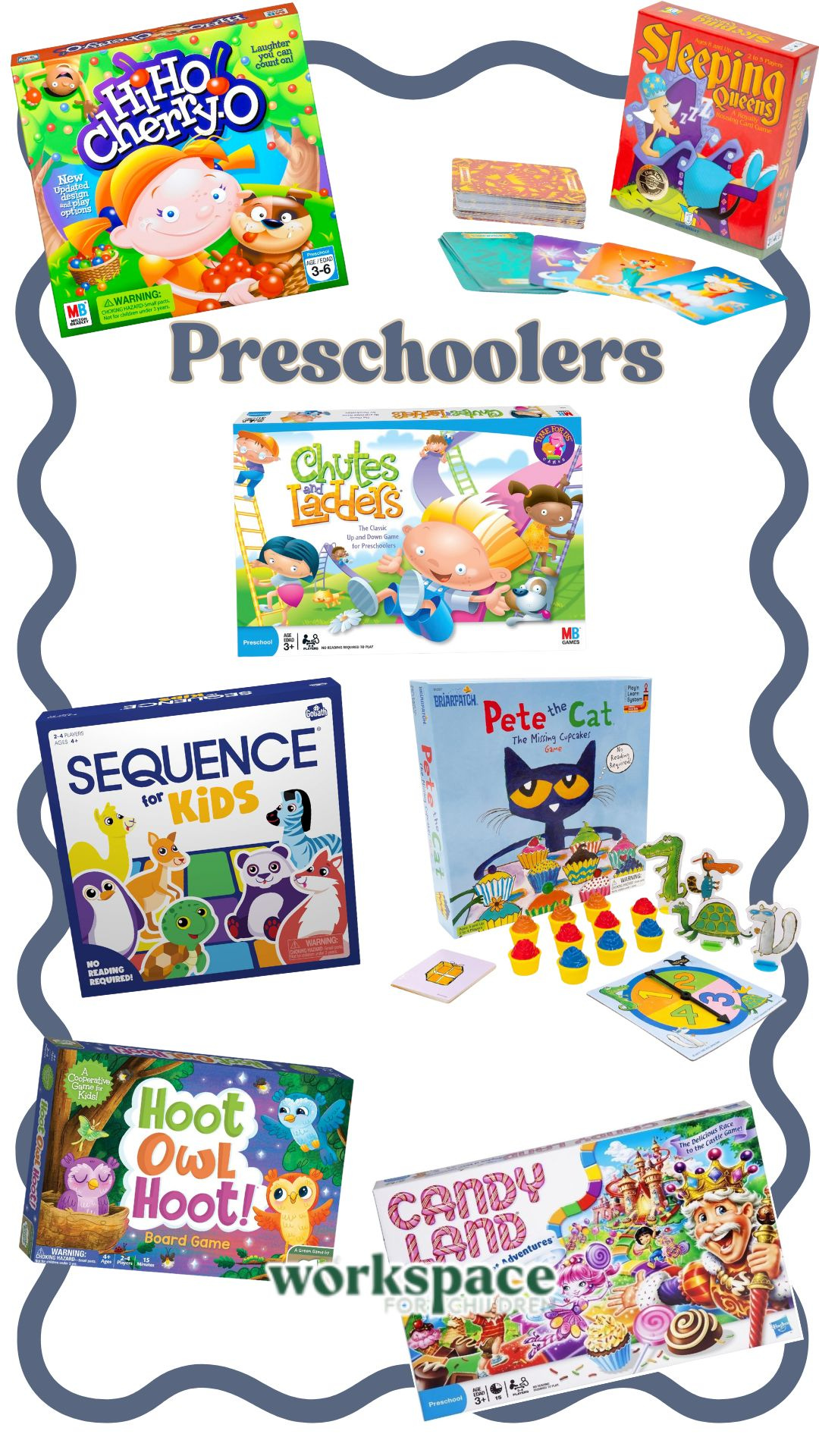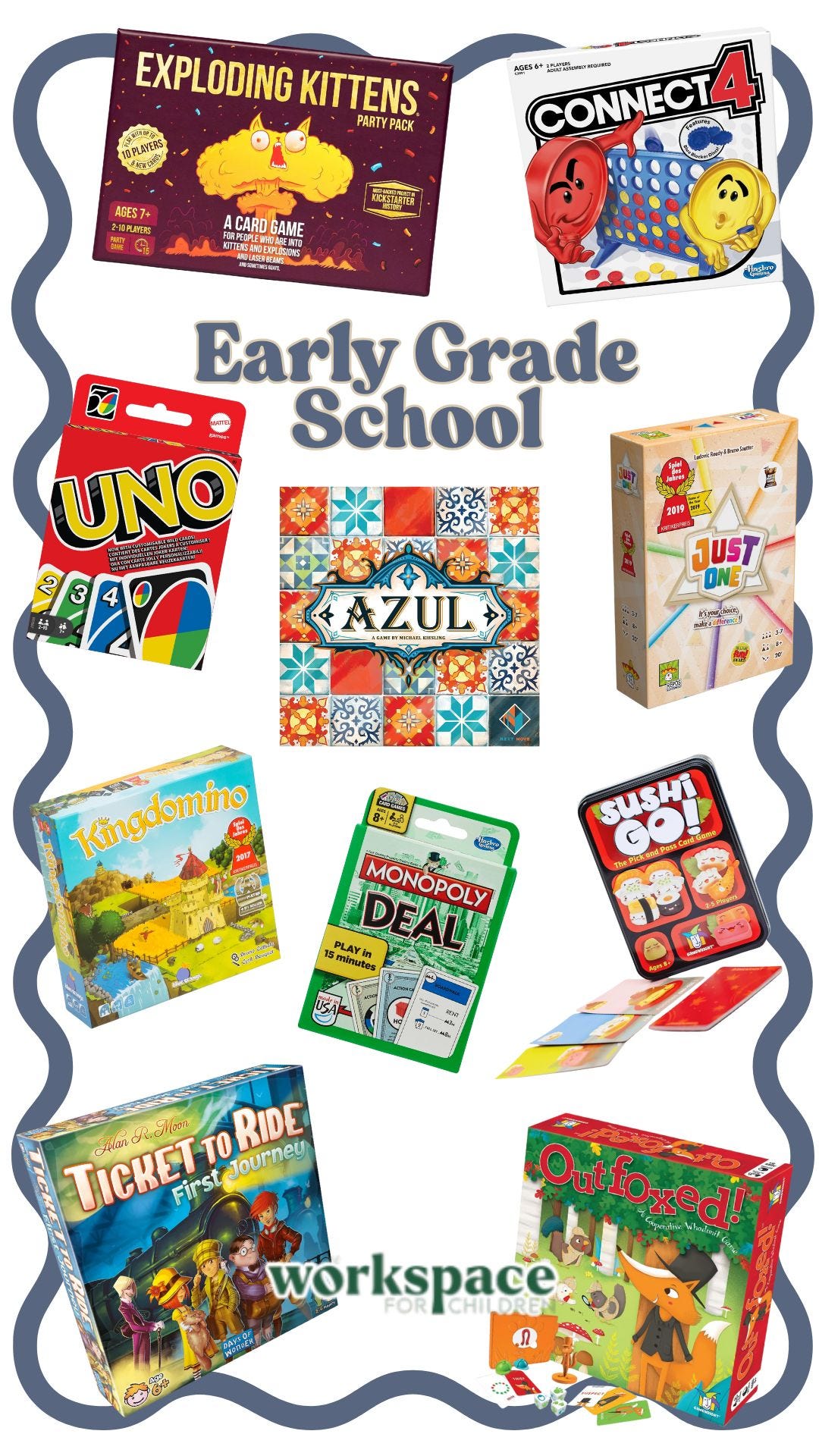From Toddlers to Teens: 27 Screen-Free Games That Build Connection (and Make Your Kids Actually Want to Hang Out)
games list for toddlers/ preschoolers/ early grades/ upper grades/ tweens and teens
We recently hosted a team of high schoolers for a track dinner. These are teens who’ve been running together all season, coming together for pasta and to hang out before one of their final meets. I watched and made small talk as they overfilled their paper plates with mac and cheese, baked ziti, salads, and spaghetti from the potluck table and found spots around the house to eat. And then something caught my eye.
No one was on their phone.
One group was crowded around the dining table, slapping cards and laughing. Another rowdier crew had pushed the furniture aside by the fireplace and was huddled together, yelling, laughing, and making chaotic hand gestures. Even my 12-year-old had somehow gotten a seat in the circle. Turns out, they were playing Taco Cat Goat Cheese Pizza. And they were completely lit up with laughter.
Later that night, when everyone had gone home, I asked my middle daughter about it. As I picked up sticky solo cups and crumpled napkins, she said, “Oh yeah, we play that all the time. On the bus or at meets. Card games are our thing.”
Teens who play card games and put their phones on the back burner? I’ll take it.
Then, last week, I was packing up my twelve-year-old for her second summer at overnight camp. As I fought to zip her bursting duffel closed, she flew into the room, socks sliding on the hardwood floors. “WAIT! We forgot my travel Rummikub set! I have to bring it. Last year, I made so many friends teaching them how to play.” We fit it in, and I smiled to myself, knowing I’d secretly stuck in a waterproof set of Taco Cat Goat Cheese Pizza for her to discover.
I’ve said it before and I’ll say it again: Games aren’t just entertainment. They give kids a way to connect, belong, laugh, and reset without the pressure of being perfect.
Why Board Games Are Secretly Magic
Games make it easier to connect. They don’t have to look you in the eye or come up with the right thing to say. They can just participate. You don’t need a big heart-to-heart for it to feel good. Games also teach a lot without anyone noticing. Waiting your turn, losing and trying again, sharing something funny. Games sneak in stuff like reading, counting, and problem-solving. And the best part? No screens or Wi-Fi. Just people in the same room, paying attention to the same thing. Shared attention, what a concept.
Games by Age Group
Toddlers (18 months - 3 years)
Focus On: Cause and effect, turn-taking, simple matching, gross motor skills
First Orchard - Cooperative fruit-picking game that teaches colors and working together
Sneaky, Snacky Squirrel Game - Simple color matching with chunky tweezers for fine motor development
Busytown Eye Found It! - A Long cooperative board with searching and finding ( I personally love this one!)
Pop the Pig - Push-your-luck game with silly outcomes that build anticipation
Zingo - Bingo with pictures instead of numbers
Simple puzzles (4-12 pieces) - Spatial reasoning and persistence
Why These Work: Short attention spans need immediate gratification. Games should be light and cooperative rather than competitive, with clear cause-and-effect relationships.
Preschoolers/ Kindergarten (3-5 years)
Focus On: Following rules, basic strategy, emotional regulation, FUN, and social skills
Candy Land - Classic pathway game for counting and color recognition
Chutes and Ladders - Introduces consequences and recovery from setbacks
Hi Ho! Cherry-O - Counting and basic addition/subtraction
Sequence for Kids - Pattern recognition and strategic thinking
Pete the Cat Game - Based on a beloved character, teaches problem-solving
Hoot Owl Hoot - Cooperative game about getting owls home before sunrise
Sleeping Queens - A Simple card game with basic math and strategy
Why These Work: Simple rules and short-term strategy. Preschoolers are beginning to understand winning/losing, but still need games that don't eliminate players and lots of practice winning and losing.
Early Grade School (6-8 years)
Focus On: Complex rules, strategic thinking, handling competition, mathematical concepts
Ticket to Ride: First Journey - Route-building with geography learning
Azul - Pattern recognition and spatial planning
Exploding Kittens - Quick card game with silly theme
Just One - Cooperative word-guessing game
Kingdomino - Tile-laying kingdom building
Sushi Go! - Drafting game with cute art and quick play
Outfoxed - Cooperative mystery-solving game
Monopoly Deal - Faster card version of classic property game
UNO - Classic card matching with strategy elements
Connect 4 - Strategic two-player game
Rummikub- Our personal family favorite
Why These Work: Around six to eight years old, kids can typically handle more complex rules and longer games. They’re developing the ability to think ahead and plan a strategy. Some kids are beginning to enjoy direct competition.
Middle Grade School (9-12 years)
Focus On: Advanced strategy, problem-solving, social negotiation, abstract concepts
Ticket to Ride - Full version with route planning and blocking (full disclosure, my husband and daughter LOVE this game and it is too hard for me to follow…)
Splendor - Engine-building with resource management
Catan Junior - Simplified island building and trading
King of Tokyo - Dice-rolling monster game with risk/reward decisions
Machi Koro - City-building with dice and strategy
Azul - Beautiful tile-laying with deeper strategy than younger versions
Taco Cat Goat Cheese Pizza - Fast-paced reaction game
Forbidden Island - Cooperative treasure-hunting adventure
7 Wonders - Civilization building (with help reading cards)
Clue - Classic deduction and logic game
Yahtzee - Probability and decision-making with dice
Phase 10 - Multi-round card game requiring planning
Why These Work: They can handle longer games (45-60 minutes), more complex strategies, and social dynamics like trading and negotiation. They’re beginning to enjoy games that require planning multiple turns ahead.
Tweens & Teens (13+ years)
Focus On: Complex strategy, social dynamics, abstract thinking, identity formation
Quick & Social Games:
Taco Cat Goat Cheese Pizza - Fast-paced reaction game
Wavelength - Team-based guessing game about concepts
Telestrations - Drawing and guessing game (like telephone with pictures)
Codenames - Word-based team game requiring abstract thinking
Just One - Cooperative word game that scales well
Strategy Games:
Ticket to Ride - Route-building across maps
Splendor - Engine-building with gems
Azul - Beautiful tile-laying game
Catan - Resource management and trading
Wingspan - Bird-themed engine builder
Party/Group Games:
Werewolf/Mafia - Social deduction and bluffing
Spyfall - Location-guessing game with hidden roles
Jackbox Games - Digital party games played with phones
Dixit - Creative storytelling with beautiful art
Why These Work: Complex rules, multiple strategies, and social dynamics. Games become tools for identity expression and peer bonding.
Pro Tips for All Ages:
Want it to actually work? Start simple. Cooperative games are a great way in. They are less pressure and more fun. Keep snacks nearby. Hungry kids end game night fast. Help them win sometimes. Not always. Model what it looks like to lose well. They’re watching. And keep a few short games around. Ten minutes is sometimes all you get.
Skip the stuff that kills the vibe. Games where someone gets kicked out? Hard pass. Nobody wants to sit and watch. Long games are tough, too. A rough rule a friend taught me is age times five minutes. Too much reading? Save it for another time unless that’s a strength. And don’t crank up the competition too soon. You’re not hosting a tournament. You’re trying to connect. The best game is the one your family actually plays. Keep it simple. Show up regularly. That’s where the magic is.
Want to start? Pick one night this week. No need for a whole event. Just clear a little time. Put a few games somewhere easy to grab. When games are visible, they get played. Let the kids pick the game. And lower the bar. You’re just playing together, being together, and that’s the whole point.
I didn’t grow up in a board game family. We were more of an art and pretend play vibe. But my husband, Dave? His family was all about games- Trivial Pursuit, Rummikub, and Backgammon. His parents were always pulling out some kind of game after dinner or on a random afternoon. They’re gone now, but every time we play a competitive family game of Rummikub with their old set, we know they’re looking down on us!
If this post gave you even one new idea or moment of relief, send it to a fellow parent who deserves it too. We’re all just trying to raise good humans without losing ourselves in the process. Thanks for reading. x. Lizzie
Want more parenting posts like this? You’ll love these: (tap the title to read the post)













Hardly a day goes by without us playing a game here, in fact I just wrote about how we pick games that are a good fit for us! We like many of the games you listed but a few other favorites are Canvas (creative AND strategic, and you get to combine clear cards to make paintings with names like verbose happiness, and you can bring just the cards to share with friends who don't want to play the whole game), Pyramid Arcade (a bunch of different games from simple to complex played with delightful rainbow pyramids), Hive (strategic, quick, extremely portable, fun to notice the similarities and differences wrt chess), Bloomchasers (spatial reasoning, building an awesome tree together, a little bit of dexterity), and Project L (polyominos!). I don't think of myself as a games person but my kids love them and they're slowly converting me.
Love, love, love that you are elevating board and card games! They have sooooooo many benefits for kids and adults of all ages, and there is truly a type game for everyone. They’re also a great mode of connection for parents who don’t love to play pretend with their kiddos, but still want to be playful together. Thanks for all of these awesome recommendations!